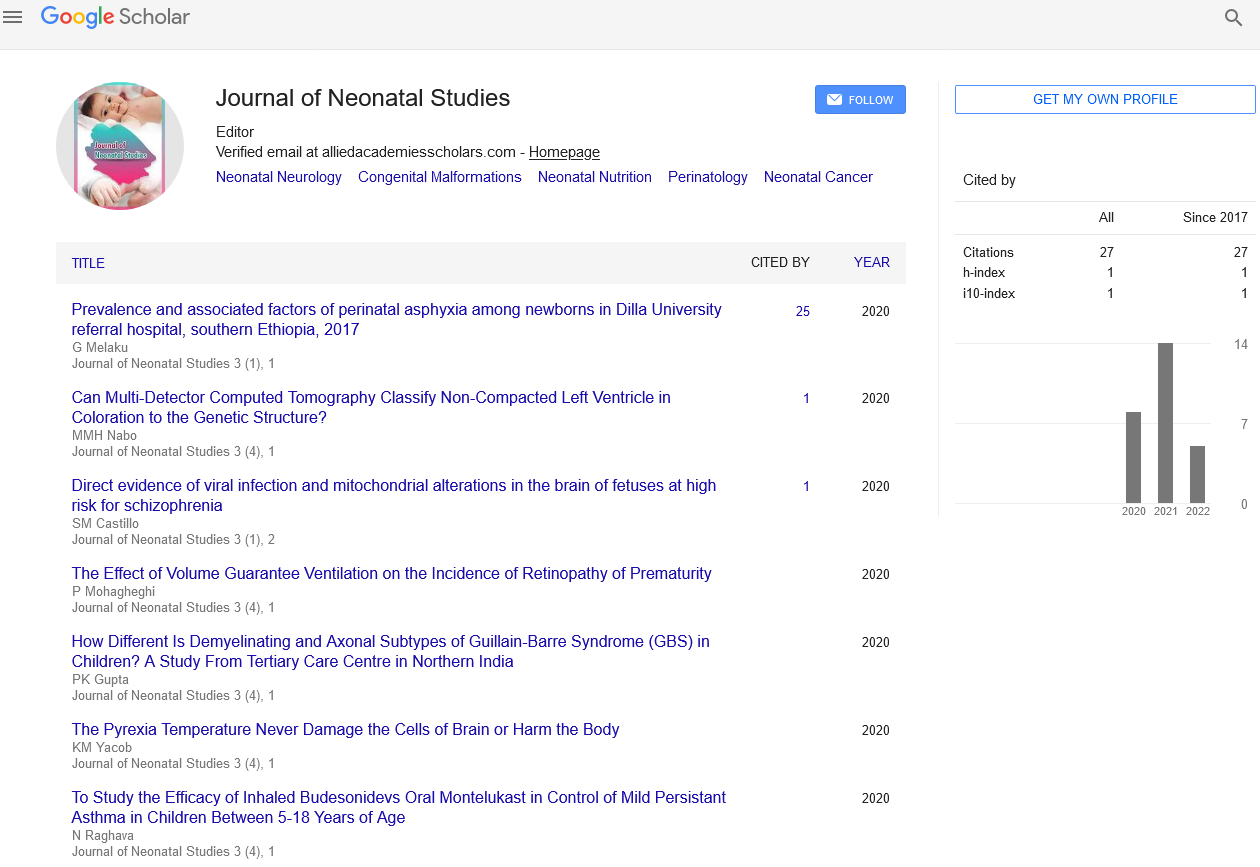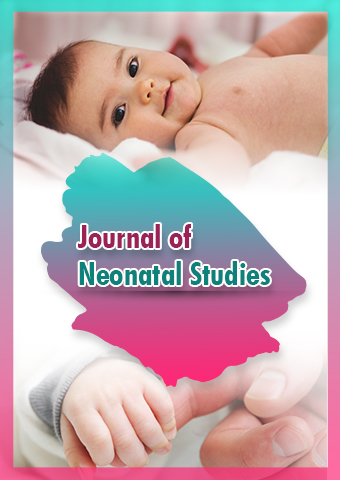Perspective - Journal of Neonatal Studies (2024) Volume 7, Issue 3
The Vital Bond: Neonates and Breastfeeding
- Corresponding Author:
- Margaret Prentice
Department of Neonatal Studies, London School of Hygiene and Tropical Medicine, United Kingdom
E-mail: margaret.prentice@mrc.gm
Received: 15-May-2024, Manuscript No. JNS-24-137931; Editor assigned: 17-May-2024, PreQC No. JNS-24-137931 (PQ); Reviewed: 31-May-2024, QC No. JNS-24-137931; Revised: 12-Jun-2024, Manuscript No. JNS-24-137931 (R); Published: 21-Jun-2024, DOI: 10.37532/JNS.2024.7(3).231-232
Introduction
Breastfeeding is more than just a way to provide nourishment; it’s a fundamental aspect of neonatal care that lays the foundation for a child’s health and well-being. The benefits of breastfeeding extend far beyond nutrition, encompassing immune support, bonding, and long-term health outcomes. In this article, we explore the importance of breastfeeding for neonates, the benefits it offers, and the challenges and strategies involved in promoting successful breastfeeding initiation and continuation.
Description
The importance of breastfeeding for neonates
Breastfeeding is uniquely suited to meet the nutritional and developmental needs of newborns, providing a perfect balance of nutrients, antibodies, and bioactive factors tailored to the infant’s requirements. The benefits of breastfeeding for neonates include:
Optimal nutrition: Breast milk contains a complex blend of carbohydrates, proteins, fats, vitamins, and minerals perfectly matched to the infant’s nutritional needs. It is easily digestible and bioavailable, promoting healthy growth and development.
Immune protection: Breast milk is rich in antibodies, enzymes, and immune cells that help protect neonates against infections and diseases, including respiratory infections, gastrointestinal illnesses, and allergic reactions.
Bonding and attachment: Breastfeeding promotes skin-to-skin contact, eye contact, and physical closeness between mother and baby, fostering bonding and attachment and promoting emotional security and well-being.
Cognitive development: Breastfeeding has been linked to improved cognitive development and neurodevelopmental outcomes, including higher intelligence scores and enhanced learning and memory abilities.
Long-term health benefits: Breastfeeding is associated with a reduced risk of chronic diseases later in life, including obesity, diabetes, asthma, and certain types of cancer.
Benefits of breastfeeding for mothers
In addition to the benefits for neonates, breastfeeding offers numerous advantages for mothers, including:
Uterine contraction: Breastfeeding stimulates the release of oxytocin, a hormone that helps the uterus contract, reducing postpartum bleeding and promoting uterine involution.
Postpartum weight loss: Breastfeeding burns extra calories and helps mothers shed pregnancy weight more quickly, supporting postpartum weight loss and body composition.
Hormonal regulation: Breastfeeding suppresses ovulation and menstruation, providing natural contraception and delaying the return of fertility in some women.
Bonding and emotional well-being: Breastfeeding promotes maternal-infant bonding, enhances maternal confidence and self-esteem, and reduces the risk of postpartum depression and anxiety.
Long-term health benefits: Breastfeeding is associated with a reduced risk of breast cancer, ovarian cancer, osteoporosis, and cardiovascular disease in mothers.
Challenges and barriers to breastfeeding
Despite the numerous benefits of breastfeeding, many mothers encounter challenges and barriers that hinder successful breastfeeding initiation and continuation. Common challenges include:
Lack of support: Inadequate support from healthcare providers, family members, and employers can undermine breastfeeding success. Mothers may face pressure to formula feed, lack access to breastfeeding education and support, or encounter unsupportive attitudes and practices in healthcare settings.
Maternal health issues: Maternal health conditions, such as inverted nipples, breast engorgement, mastitis, and low milk supply, can pose challenges to breastfeeding initiation and maintenance. Addressing these issues requires timely assessment, management, and support from healthcare providers.
Infant health issues: Neonatal health issues, including prematurity, low birth weight, oral motor difficulties, and medical conditions requiring hospitalization or separation from the mother, can complicate breastfeeding and require specialized support and interventions.
Cultural and societal factors: Cultural beliefs, social norms, and workplace policies may influence breastfeeding practices and attitudes, creating barriers to breastfeeding initiation and continuation. Factors such as lack of privacy, limited maternity leave, and stigma surrounding breastfeeding in public can deter mothers from breastfeeding.
Strategies to promote successful breastfeeding
Addressing the challenges and barriers to breastfeeding requires a multifaceted approach involving healthcare providers, policymakers, employers, communities, and families. Key strategies to promote successful breastfeeding include:
Prenatal education and counseling: Providing comprehensive breastfeeding education and counseling during pregnancy helps prepare expectant mothers for breastfeeding, promotes realistic expectations, and addresses concerns and misconceptions.
Skilled lactation support: Access to skilled lactation support, including certified lactation consultants, peer counselors, and breastfeeding support groups, is essential for assisting mothers with breastfeeding initiation, overcoming challenges, and building confidence and skills.
Supportive healthcare practices: Healthcare providers play a crucial role in supporting breastfeeding mothers through evidence-based practices, including early skin-to-skin contact, rooming-in, responsive feeding, and promoting exclusive breastfeeding for the first six months of life.
Workplace support: Employers can support breastfeeding mothers by implementing lactation support policies, including paid maternity leave, flexible work schedules, on-site lactation facilities, and breastfeeding-friendly workplace environments.
Community and social support: Community-based initiatives, including breastfeeding peer support groups, community breastfeeding clinics, and public awareness campaigns, help create a supportive breastfeeding culture and normalize breastfeeding in society.
Policy advocacy: Policymakers can support breastfeeding by enacting legislation and policies.
Conclusion
Breastfeeding is more than just a way to provide nourishment; it’s a fundamental aspect of neonatal care that lays the foundation for a child’s health and well-being. The benefits of breastfeeding extend far beyond nutrition, encompassing immune support, bonding, and long-term health outcomes. In this article, we explore the importance of breastfeeding for neonates, the benefits it offers, and the challenges and strategies involved in promoting successful breastfeeding initiation and continuation.

